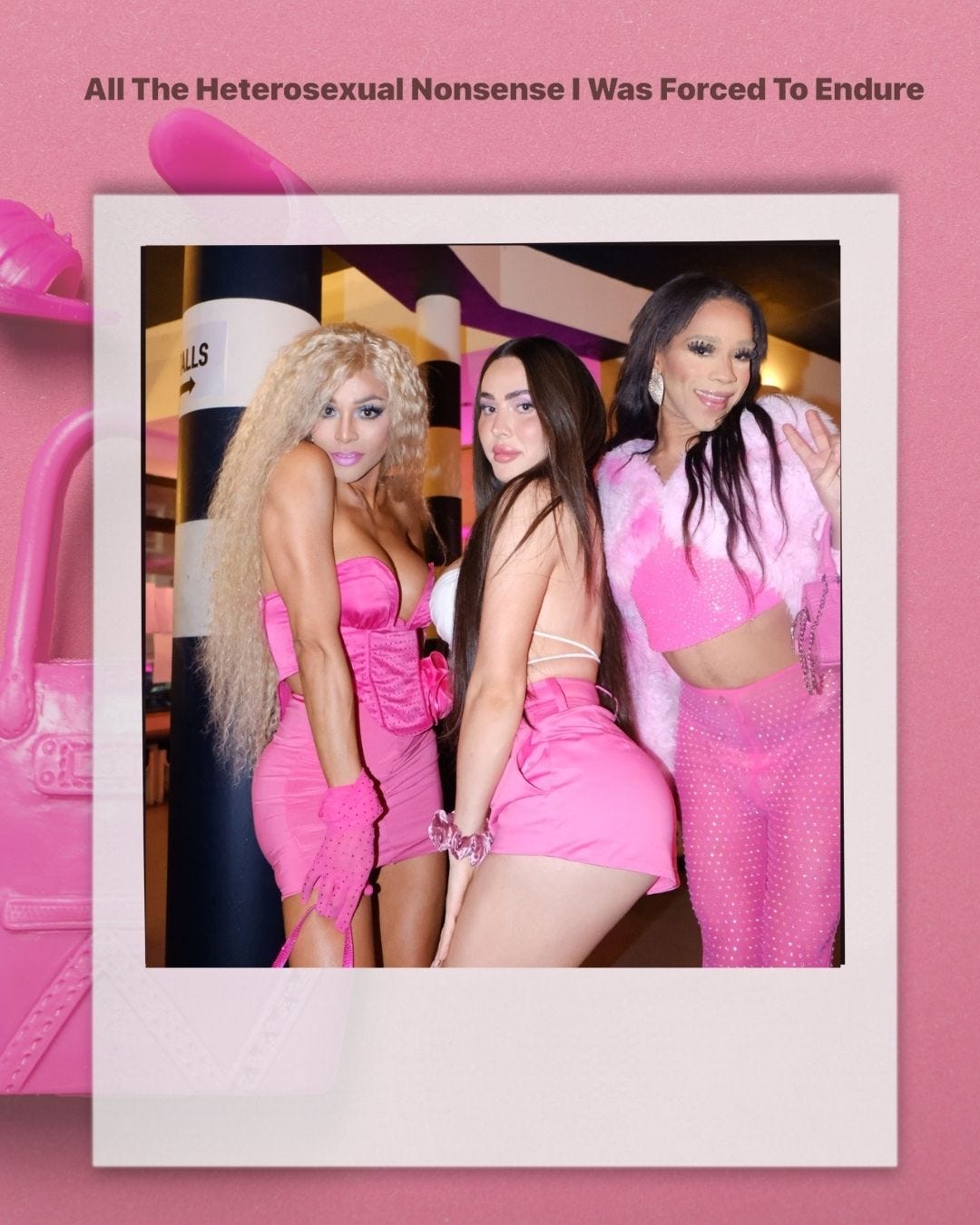Dolls Go Free! What happened when London dedicated a Barbie screening for trans women
Why prioritising the communal joy of trans femmes is revolutionary.
The release of the fabulously camp Barbie movie has truly been a cultural reset for the girls, gays and theys. Our once dreary grey English streets are suddenly pockmarked with pink in various hues, the words “Hi Barbie” ring lightly from every corner. Within queer circles in the UK the release has delivered a much deserved cultural reset to London life.
Barbiemania has had us all digging deep in the closet to pull out that one pink dress from five years ago just to remember that you had dyed it black in the last trend cycle. A return to hyper-femininity and true, frivolous camp.
Our conservative government, unfortunately, didn’t share our excitement. In the middle of our celebrations and viewing party set-ups, the war on LGBTQIA+ rights in the UK continued. From dangerously long wait-lists for trans healthcare, to nationwide gender neutral toilet bans our country has been rightfully declared TERF Island.
Which is why a Barbie screening for trans people was both delightful and necessary.
Doll’s go free!
While living through a violent and abusive moral panic the London queer community's response was to build community and be better. Jaye Hudson, founder of Trans Girls On Film, organised a unique Barbie screening called Dolls Go Free! which she describes as “prioritising the communal joy of trans femmes.”
Trans femmes were able to attend the event for free with “Kens + Kenbies” (trans masculine people) being offered discounted tickets. Cis allies had the option to pay the full price ticket or pay it forward, ensuring that we are afforded the appropriate space to support our siblings and unify as one community in support of trans joy.
Alongside the obvious connection of celebrating the franchise’s first trans character, the name of the event is a play on the queer slang term, “doll” meaning trans femme person.
“[The term] is mostly adopted by trans femmes referring to each other as such. It felt stupid not to play on that for the big Hollywood doll movie, “ says Jaye,
“The term ‘doll’ has a sticky origin to lay claim to, I think the closest guess is to afford it to sex workers and ballroom. There's a rich oral tradition amongst black and latino ballroom families. Theres also the Polari term, ‘Dollie’ but you can drive yourself mad trying to cite the etymology.”
Polari is a language developed in the 20th century and was used by the LGBTQ* community in Britain as a means of communicating in private in a time when homosexual activity was criminalised. ‘Dollie’ in Polari is translated to “pretty, nice or pleasant.”
“It felt so monumental for ‘femininity’ or ‘transness’ more broadly,’ reports Pierce Eldridge, Trans literary editor of worms magazine and co-founder of Compost library.
“I knew it was going to be a safe environment to cackle, I was excited for the movie, but also the beauty I knew I would experience all around me. We were roaring with laughter and genuine, affective, radical participation in the collectivising necessity to commune together.”
Unity and solidarity is and always has been, one of the most powerful tools we have at our disposal. While we may know and feel that we show our togetherness as a community regularly in our bars, clubs and spaces, it's important to note that just because we feel together, that doesn't necessarily indicate that other parts of our community are outright feeling that togetherness and that support.
Why this matters
At the end of 2022 transphobic hate crimes in the UK had risen by 56% compared to the years previous. Where trans lives are “debated”, homophobia thrives. There was recently a homophobic stabbing outside of a notorious cabaret bar in the queer-friendly area of Clapham, the public was quick to remind us in the comment section of news pages, that this is what we get for accepting and supporting trans people.
It is, of course, a lie - intended by bigots to divide and conquer our community. We are currently experiencing a global pushback against LGBTQ* rights and livelihoods. They will never have the power to stop us existing or challenge our unwavering love for each other, but it does have the power to make our lives hard.
Don’t just tell your trans siblings that you support them, show them all of the ways that you will. Dolls Go Free! is a shining example of how to get it done and is an open invitation for you to do the same.
Jaye shares that allyship allowed her to secure funding and form events like this one. “These acts can be very precious when trans people are so under attack right now,” she says.
Rally together in allyship, start fundraisers, Gofundme pages, reach out to allies and ask them to pay their part and form events just like this one. When facing mass extremism and hatred, we have always had and will always have, each other.
-
Thank you for reading! All The Het Non is an independent publication, and we pay our fabulous writers for each other, from the money we get from our generous readers. Please consider subscribing!
—
Kaycia Ainsworth is an editor, journalist, PR Executive and stylist whose work analyses art, design and culture in the context of philosophy, science and societal observation. She previously helmed Mission Statement Magazine as their fashion editor and has also worked with Alexander McQueen, INSIDER, Gorillas, SCHÖN and was recently heralded in Michigan and Canada for coining the term ‘content sludge’ in her article ‘The Content Culture Crisis’ for Polyester.









This filled me with so much joy! The freedom to cackle is one of my favourite things ever 🥰